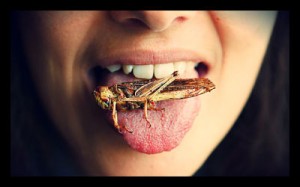Eating Insects Could Fight World Hunger

Entomophagy, or the practice of eating insects, could fight world hunger and global warming. A 200-page report, released by the UN Food and Agriculture Organization (FAO), at the organization’s Rome headquarters, is calling for restaurants, chefs, and food writers to promote eating insects.
According to the FAO, insects provide high-quality protein and nutrients compared to meat and fish. They can also be an important food supplement for undernourished children, reproduce quickly, and leave a low environment footprint. Insects are high in protein, and can also be rich in copper, iron, phosphorus, manganese, magnesium, selenium and zinc. Furthermore, insects are four times more efficient in turning feed mass into edible meat, which suggests that food could be produced more cheaply and with fewer emissions.
The long history of entomophagy starts with grasshoppers served “toasted in a little oil with garlic, lemon and salt” on the streets of Oaxaca, Mexico and fly eggs called “Mexican caviar” that Montezuma devoured. Currently, two billion people worldwide indulge in the delicacy. However, consumer digestion will remain an issue when integrating insects into the Western diet. While ingesting insects outright makes many Westerners squeamish, reports by the FDA suggest that insect fragments can already be found several food products such as wheat and tomato juice but is safe to eat on a small scale.
Though this new protein may not find it’s way onto dinner plates in the near future, eating insects could fight would hunger and is an firm step forward in maintaining food security world wide.
– Kira Maixner
Source: The Telegraph
